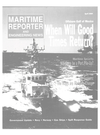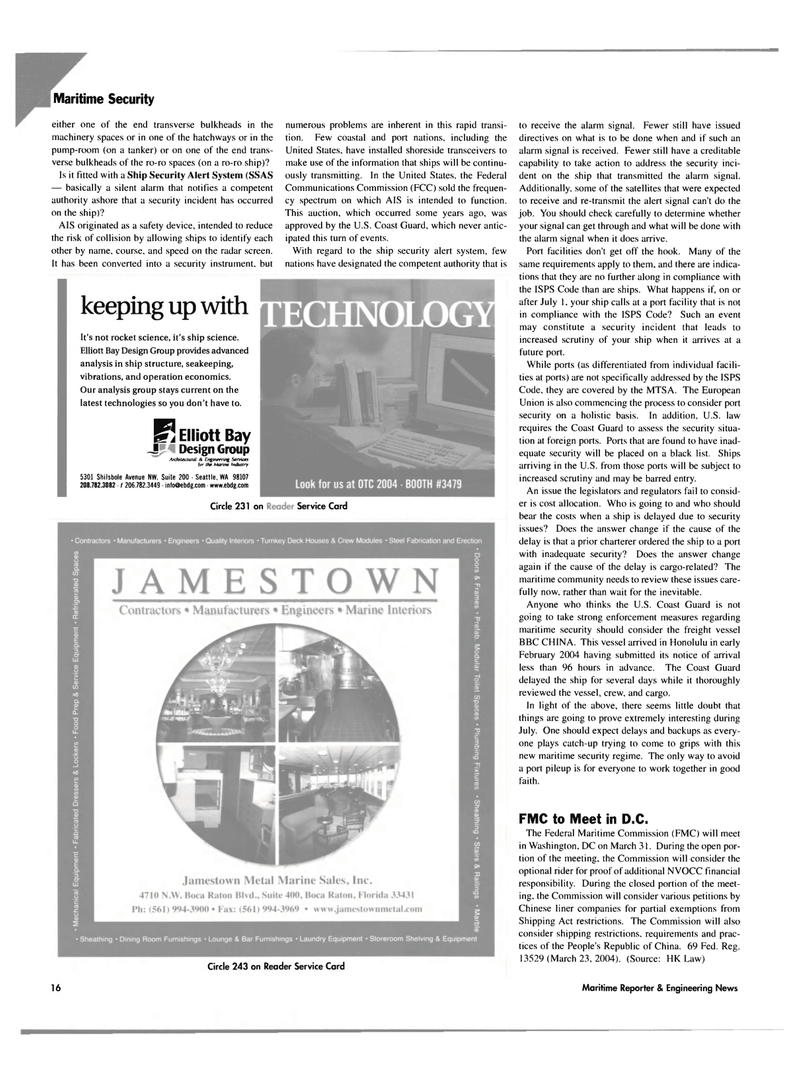
Page 16: of Maritime Reporter Magazine (April 2004)
Offshore Technology Yearbook
Read this page in Pdf, Flash or Html5 edition of April 2004 Maritime Reporter Magazine
Maritime Security either one of the end transverse bulkheads in the machinery spaces or in one of the hatchways or in the pump-room (on a tanker) or on one of the end trans- verse bulkheads of the ro-ro spaces (on a ro-ro ship)?
Is it fitted with a Ship Security Alert System (SSAS — basically a silent alarm that notifies a competent authority ashore that a security incident has occurred on the ship)?
AIS originated as a safety device, intended to reduce the risk of collision by allowing ships to identify each other by name, course, and speed on the radar screen.
It has been converted into a security instrument, but keeping up with
It's not rocket science, it's ship science.
Elliott Bay Design Group provides advanced analysis in ship structure, seakeeping, vibrations, and operation economics.
Our analysis group stays current on the latest technologies so you don't have to.
Wi Elliott Bay
JDesign Group
Architectural & engineering Services for the Marine Industry 5301 Shilsbole Avenue NW. Suite 200 • Seattle, WA 98107 208.782.3082 t 206.782.3449 [email protected] • www.ebdg.com
Circle 231 on numerous problems are inherent in this rapid transi- tion. Few coastal and port nations, including the
United States, have installed shoreside transceivers to make use of the information that ships will be continu- ously transmitting. In the United States, the Federal
Communications Commission (FCC) sold the frequen- cy spectrum on which AIS is intended to function.
This auction, which occurred some years ago, was approved by the U.S. Coast Guard, which never antic- ipated this turn of events.
With regard to the ship security alert system, few nations have designated the competent authority that is
Service Card to receive the alarm signal. Fewer still have issued directives on what is to be done when and if such an alarm signal is received. Fewer still have a creditable capability to take action to address the security inci- dent on the ship that transmitted the alarm signal.
Additionally, some of the satellites that were expected to receive and re-transmit the alert signal can't do the job. You should check carefully to determine whether your signal can get through and what will be done with the alarm signal when it does arrive.
Port facilities don't get off the hook. Many of the same requirements apply to them, and there are indica- tions that they are no further along in compliance with the ISPS Code than are ships. What happens if, on or after July 1, your ship calls at a port facility that is not in compliance with the ISPS Code? Such an event may constitute a security incident that leads to increased scrutiny of your ship when it arrives at a future port.
While ports (as differentiated from individual facili- ties at ports) are not specifically addressed by the ISPS
Code, they are covered by the MTSA. The European
Union is also commencing the process to consider port security on a holistic basis. In addition, U.S. law requires the Coast Guard to assess the security situa- tion at foreign ports. Ports that are found to have inad- equate security will be placed on a black list. Ships arriving in the U.S. from those ports will be subject to increased scrutiny and may be barred entry.
An issue the legislators and regulators fail to consid- er is cost allocation. Who is going to and who should bear the costs when a ship is delayed due to security issues? Does the answer change if the cause of the delay is that a prior charterer ordered the ship to a port with inadequate security? Does the answer change again if the cause of the delay is cargo-related? The maritime community needs to review these issues care- fully now, rather than wait for the inevitable.
Anyone who thinks the U.S. Coast Guard is not going to take strong enforcement measures regarding maritime security should consider the freight vessel
BBC CHINA. This vessel arrived in Honolulu in early
February 2004 having submitted its notice of arrival less than 96 hours in advance. The Coast Guard delayed the ship for several days while it thoroughly reviewed the vessel, crew, and cargo.
In light of the above, there seems little doubt that things are going to prove extremely interesting during
July. One should expect delays and backups as every- one plays catch-up trying to come to grips with this new maritime security regime. The only way to avoid a port pileup is for everyone to work together in good faith.
FMC to Meet in D.C.
The Federal Maritime Commission (FMC) will meet in Washington, DC on March 31. During the open por- tion of the meeting, the Commission will consider the optional rider for proof of additional NVOCC financial responsibility. During the closed portion of the meet- ing, the Commission will consider various petitions by
Chinese liner companies for partial exemptions from
Shipping Act restrictions. The Commission will also consider shipping restrictions, requirements and prac- tices of the People's Republic of China. 69 Fed. Reg. 13529 (March 23,2004). (Source: HK Law)
Maritime Reporter & Engineering News
Circle 243 on Reader Service Card 16

 15
15

 17
17
